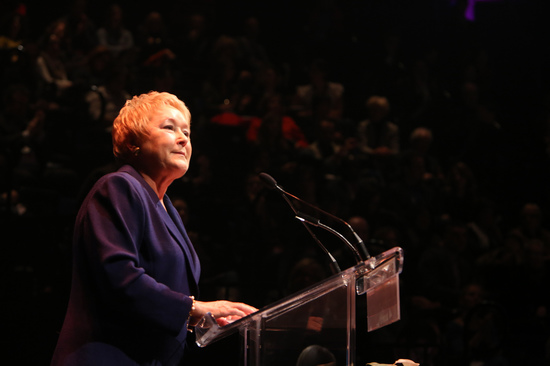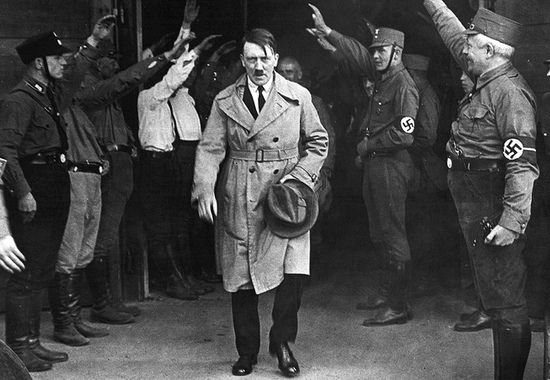Bravo, to my fellow Quebecers for overthrowing a government that has misrepresented and disrespected the values of its citizens. On April 7th 2014 Quebecers once again decided that the queen was doing an awful job. And so, in typical fashion--off with her head! By "queen" I'm referring to Quebec's fallen Premier Pauline Marois.
But you probably already know that. After all, she was, and continues to be, one of the most efficiently scrutinized, patronized and belittled politicians in Canada. Robert Mannis was the first to publically grant Pauline Marois her nickname. Mannis wrote a satirical article in the Suburban titled, "An Open Letter To Queen Pauline".
This denigration was not the first of its kind. Indeed, there was a blitzkrieg of denigrating photos or videos of the Premier. Wherever you looked there she was; eating pasta, dressed in a hijab, or a KKK member or Hitler, or completely transmogrified to yapping Chihuahua.
Maria Totino on Techpresident.com
In the Victorian era, royals who abused the trust of the people were led to the guillotine. Citizens would gather around and cheer at the site of blood, which made me question if this forthcoming and modern society that we live in is really much better.
Now, I suppose that I should clarify that in no way do I, or have I ever condoned the platform or actions of the PQ. Nevertheless, I have always appreciated the diversity of opinion, or at the very least the idea of the diversity of opinion.
Unfortunately, we seem incapable of separating politics from the political leader. Instead we concentrate on the relationship or feelings--emphatically love and hatred-- of the leader or a party.
Personalizing politics, or the presidentialization of politics, makes political affairs and governmental decisions easier to explain to others. However, when we do this, information and meaning is lost in translation. Albert Einstein said: "make everything as simple as possible. But not simpler". This may explain why we make fun of politicians; it is simpler to make fun of Pauline Marois and the PQ than it is to confront the complexities that are entrenched in policy, regulation and legislation.
Yes, the presidentialization makes politics easier to explain. In particular, it helps explain our views to people we want to convince. This argument bases itself not so much on the fact that we are right, but that they, the enemy, are wrong. Specifically, it was not that Philippe Couillard was a brilliant, avant-garde or a pioneering figure in the 2014 Quebec election. Rather, it was because many in and outside of QC reviled Pauline Marois.
Albeit, personalizing politics does not only take on the negative form. Actually, if a leader is liked it can have equally risky resulty. Off the top of my head, I can think of a leader who was adored by his citizens so much that they followed him to one of the bloodiest wars known to man.
Recuerdos de pandora at Flickr.com
A case in point is that Hitler was not vilified but idolized. His policy was practically unheeded.
Ergo, leader idolization or demonization can have devastating effects on democracy. Despite this knowledge, priming and branding continue to be common practices in the realm of politics, used to galvanize support and polarize the electorate. For instance, Hitler was a charismatic leader, and led his citizens to the battlefield to die. Similarly, the demonized Pauline Marois paralyzed fearful Quebecers' ability to reflect and rationalize. This led to the re-election of the PLQ, a party that was ousted on alleged counts of corruption.
Admittedly, it is not fair to compare Pauline Marois and Hitler to the same degree. However, it does depictively demonstrate the extent to which people are distracted by political personas. It has become a vigorous game of four corners and if we step on the crack we will break our partisan backs.
In the case of the Quebec election the polarizing gadget was the matter of separation. Was it that Pauline Marois was as despised or as cruel a person as we depicted her to be? Or was it that we feared what she represented: separation?
Quebec Solidaire, Coalition Avenir Quebec and the Green Party are also in favour of separation. Yet, we did not vilify any of these leaders, at least not nearly as much as we hated Pauline Marois. It was only natural then that we would vote for the PLQ; they were the only seemingly sane option.
Although this is not necessarily wrong, it is not very effective either. The PLQ was voted out of office in 2012 after many allegations of bribery and collusion were brought against several MNPs at the Charbonneau Commission.
For instance, an infamous policy that ascribed itself to Pauline Marois' name was the Charter of Values. This is where the PLQs platform becomes vague. Under the leadership of Philippe Couillard, the Charter of Values will not imminently disappear. Indeed, Philippe Couillard said that he would find a way to make a more agreeable charter, making him (as is as old as time) the lesser of two evils.
Demonization characterizes politicians not only as being wrong, but also dumb, racist, and ugly. This is the clear message that people are trying to say while hiding behind defaming photos, if they are not already outright stating it. What is worse is that even though the election is over, we continue to hassle the woman who was once our Premier.
There is nothing worse than overweening winners.
True: politicians do make really bad decisions and should be preconized for these gaffes.
5 Ridiculous Things Said by Canadian Politicians in the Last Year
False: it is fair to blame Pauline Marois for the demise of the PQ. Of course the Charter of Values, was absurd, but is it fair to attribute Madame Marois for single-handedly ruining the PQ? Marois is also made fun of for the holding of the shortest term in government in all of Quebec history; thereby revealing the hot and cold spirit of Quebecers (myself proudly included). Exemplarily, in September 2012, QC voted the PQ in, in order to overthrow the PLQ. In April 2014 we voted them out.
Okay. This is more than mere temperament. A key difference between the campaign of 2012 and the campaign of 2014 was that the PQ downplayed ideology and focused on current needs and wants of the people: an end to corruption and better education.
The issue was that once it did assume government, the PQ found itself hard-pressed not to include ideological boundaries. It did not change with the times and did not know what Quebecers wanted and was restricted by a by-gone era of extremist political partisans. An so, like any party in this situation would do, it tested the waters. Unfortunately, it just so happened that the waters of separation, a secular charter and patriotism had piranhas in it.
Indeed, the PQ's need for major reconstruction or even dissolution is no secret. Somewhere along the way it lost touch with the values of the new and not-so-new generations.
How to Lose an Election in Quebec
As much as this says about the PQ and Pauline Marois, what does this say about QC voters?
1- Are we a competent and intelligent society for ousting a government that misguided us and who we no longer supported?
2- Est-ce que nous sommes a bit confused and don't know who to trust?
3- Is there no political party that best represents Quebecers?
I believe that it is all of the above, but everyone will have different answers to these questions. What is certain is that we need to start voting not only with our ears, eyes, and heart, but also with our brains. We must identify and squash the hortatory language that politicians use and pull out the good stuff.
WHAT DO YOU THINK? TAKE A POLL.
And so, how then should we vote for our leaders? How do we garner support: by understanding your values and policy. How do you do this? A common response is to ask friends who understand all of this political mumbo jumbo or have time to do it. This is good tactic on the one hand because it keeps us in touch with deliberative democracy. However, in order to deliberate you need to be informed. Besides, I might not know whether or not my friend--well you know the sexist, rich McGill student-- and I may share the same values.

-thumb-550x412-4767.jpg)

Leave a comment